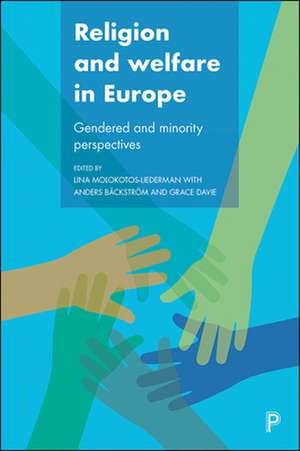Religion and Welfare in Europe: Gendered and Minority Perspectives
Editat de Lina Molokotos-Liedermanen Limba Engleză Paperback – 18 sep 2018
Religion and Welfare in Europe examines social change in Europe in recent years and how it relates to religion, minority populations, and gender, and their interacting effects on inclusion and conflict. Bringing together international experts in a wide range of fields, the book looks closely at various practices of social service provision in a number of different countries, exploring links between values, welfare, and social change, with particular attention to changes brought about by recent austerity measures.
| Toate formatele și edițiile | Preț | Express |
|---|---|---|
| Paperback (1) | 382.60 lei 6-8 săpt. | |
| Bristol University Press – 18 sep 2018 | 382.60 lei 6-8 săpt. | |
| Hardback (1) | 883.69 lei 6-8 săpt. | |
| Bristol University Press – 12 sep 2017 | 883.69 lei 6-8 săpt. |
Preț: 382.60 lei
Nou
Puncte Express: 574
Preț estimativ în valută:
73.21€ • 79.77$ • 61.69£
73.21€ • 79.77$ • 61.69£
Carte tipărită la comandă
Livrare economică 23 aprilie-07 mai
Preluare comenzi: 021 569.72.76
Specificații
ISBN-13: 9781447343523
ISBN-10: 1447343522
Pagini: 320
Ilustrații: 8 line drawings
Dimensiuni: 159 x 235 x 23 mm
Greutate: 0.48 kg
Ediția:2
Editura: Bristol University Press
Colecția Policy Press
ISBN-10: 1447343522
Pagini: 320
Ilustrații: 8 line drawings
Dimensiuni: 159 x 235 x 23 mm
Greutate: 0.48 kg
Ediția:2
Editura: Bristol University Press
Colecția Policy Press
Notă biografică
Lina Molokotos-Liederman is a Visiting Fellow at the Uppsala Religion and Society Research Centre at Uppsala University, Sweden, and a Post-Doc Associate of the Groupe Sociétés, Religions, Laïcités (GSRL/CNRS), Paris. She holds a PhD in sociology of religion from the Ecole Pratique des Hautes Etudes (EPHE), Paris. Anders Bäckström is Professor Emeritus in Sociology of Religion at Uppsala University. He established both the Uppsala Religion and Society Research Centre and The Impact of Religion programme. Grace Davie is Professor Emeritus in Sociology at the University of Exeter, UK and senior adviser to The Impact of Religion programme.
Cuprins
List of tables, figures and maps
Acknowledgements
Notes on contributors
One Introduction
Anders Bäckström
Part One: Thinking methodologically: approaches to research and practice
Two Between contextuality and comparability: a dilemma in qualitative comparative case studies
Pål Repstad
Three Using case studies in religion, values and welfare research
Olav Helge Angell and Lina Molokotos-Liederman
Four Social cohesion: from research to practice
Olav Helge Angell, Marjukka Laiho, Anne Birgitta Pessi and Siniša Zrinščak
Part Two: Thinking regionally: key case studies in welfare and religion in Europe
Fire The WaVE project as a record of religious and social transformations in northern Europe
Anders Bäckström
Six The intersections of state, family and church in Italy and Greece
Margarita Markoviti and Lina Molokotos-Liederman
Seven Religion, welfare and gender: the post-communist experience
Siniša Zrinščak
Part Three: Gendered and minority perspectives
Eight Understanding religious minority communities as civil society actors
Annette Leis-Peters
Nine Striving to live the good life: the tension between self-fulfillment and family obligations for women in northern England
Martha Middlemiss Lé Mon
Ten Religion as a resource or as a source of exclusion?
The case of Muslim women’s shelters
Pia Karlsson Minganti
Eleven The moral and gendered crisis of the Italian welfare system seen through the prism of migrant women’s reproductive health
Annalisa Frisina
Part Four: Drawing the threads together
Twelve Welfare and values in Europe: insights drawn from a comparative cross-country analysis
Effie Fokas
Thirteen Afterword
Grace Davie
Appendix: the WaVE team
Index
Acknowledgements
Notes on contributors
One Introduction
Anders Bäckström
Part One: Thinking methodologically: approaches to research and practice
Two Between contextuality and comparability: a dilemma in qualitative comparative case studies
Pål Repstad
Three Using case studies in religion, values and welfare research
Olav Helge Angell and Lina Molokotos-Liederman
Four Social cohesion: from research to practice
Olav Helge Angell, Marjukka Laiho, Anne Birgitta Pessi and Siniša Zrinščak
Part Two: Thinking regionally: key case studies in welfare and religion in Europe
Fire The WaVE project as a record of religious and social transformations in northern Europe
Anders Bäckström
Six The intersections of state, family and church in Italy and Greece
Margarita Markoviti and Lina Molokotos-Liederman
Seven Religion, welfare and gender: the post-communist experience
Siniša Zrinščak
Part Three: Gendered and minority perspectives
Eight Understanding religious minority communities as civil society actors
Annette Leis-Peters
Nine Striving to live the good life: the tension between self-fulfillment and family obligations for women in northern England
Martha Middlemiss Lé Mon
Ten Religion as a resource or as a source of exclusion?
The case of Muslim women’s shelters
Pia Karlsson Minganti
Eleven The moral and gendered crisis of the Italian welfare system seen through the prism of migrant women’s reproductive health
Annalisa Frisina
Part Four: Drawing the threads together
Twelve Welfare and values in Europe: insights drawn from a comparative cross-country analysis
Effie Fokas
Thirteen Afterword
Grace Davie
Appendix: the WaVE team
Index
Recenzii
“This new volume brings a fresh perspective. . . and makes an impressive contribution to our knowledge in this important area.”
"A fascinating volume exploring religion, gender, minorities, and welfare in Europe, offering significant insights into the link between values, welfare, and social change."
"This is a timely and authoritative text—fit for students and experts alike—which builds on the insights of the WaVE research to shed new light on gender issues and minority religious groups in Europe. The comparative perspective encompassing diverse national settings provides an important backdrop for analyzing some of the key social welfare implications of an increasingly culturally diverse continent."
“A fascinating, complex, rich book rooted in deep research and providing an innovative and revealing new analysis in the intersection of welfare, women and minorities.”
